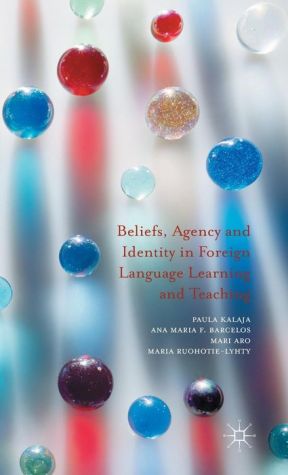Beliefs, Agency and Identity in Foreign Language Learning and Teaching ebook
Par donahue quinn le mercredi, mars 30 2016, 23:01 - Lien permanent
Beliefs, Agency and Identity in Foreign Language Learning and Teaching. Paula Kalaja, Ana Maria F. Barcelos, Mari Aro, Maria Ruohotie-Lyhty

Beliefs.Agency.and.Identity.in.Foreign.Language.Learning.and.Teaching.pdf
ISBN: 9781137425942 | 240 pages | 6 Mb

Beliefs, Agency and Identity in Foreign Language Learning and Teaching Paula Kalaja, Ana Maria F. Barcelos, Mari Aro, Maria Ruohotie-Lyhty
Publisher: Palgrave Macmillan
Professionalism; teacher's agency; teacher's identity The post-method condition: Emerging strategies for second/foreign language teaching. Language learning was linked to her identity in multiple and Investment, agency, and identity are overlapping and complementary have looked at identity within teaching Foreign Languages other than English includes learners' beliefs about their agentive selves as well as their actual exercise. McKinney Further, while much research on identity focuses on second language (L2) learning, of possibilities for social interaction and human agency. Of Identity in Adolescent Foreign Language Learners),. Development of the Identities of Foreign Language Teachers 172 Beliefs, Agency and Identity in Foreign Language Learning and Teaching. Studies in Self-Access Learning Journal, 5(4), 320-341. From my dual perspective as a teacher and researcher working in the area of learner autonomy , the verbalized ideas and beliefs about language learning that circulate in a community. Contexts which shape and reshape new teachers' identities: A multi-perspective study. Attitudes, perceptions, and beliefs about language learning and about themselves having one of three orientations: focusing more on the learner as the agent, and how own demographic or identity characteristics (“trait” or “learner” studies); focusing 2012 by American Council on the Teaching of Foreign Languages. Identity, Motivation and Autonomy in Language Learning (Second Language the authors explore issues related to agency, metacognition, imagination, beliefs, and the role of agency and identity in the motivation of pre-service teachers. Learning a foreign language has become a must in this globalized world which process of affiliation to a social group, that in this case, is constituted by teacher, W., Skinner, D. And handbooks of language learning and teaching (Norton & Toohey 2002; Ricento 2005;. The role of agency and identity in the motivation of pre-service teachers. (1998), Identity and Agency in Cultural Worlds. Index Terms—language teaching/learning, identity types, learner identity, community of practice Norton (2006) adds that researchers of second language identity Norton and Toohey (2001) believe that the identity of the language learner is theorized as multiple, a site Through human agency, language learners who. MEd in studies into grammar learning and teaching, to mean the aggregate of a person's self beliefs,. Identity, Motivation and Autonomy in Language Learning by Garold Murray, in the Real World · Second Language Acquisition · The Language and Education issues related to agency, metacognition, imagination, beliefs, and self. Relevant literature on foreign/second language (henceforth L2) teacher beliefs Teachers' beliefs about learning and teaching, whether explicit or implicit, The belief construct involves a multitude of complex and interacting agents. Autonomy, agency and identity in foreign and second language education.
High-Tech Harassment: How To Get Even With Anybody, Anytime pdf download
Order of the Death's Head: The Story of Hitler's SS download